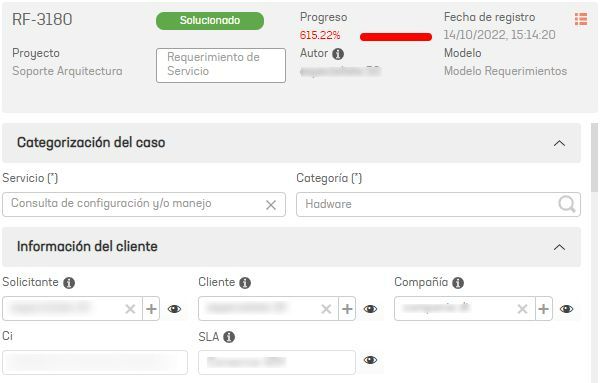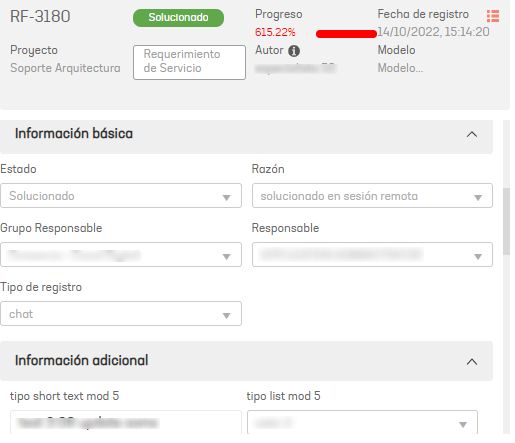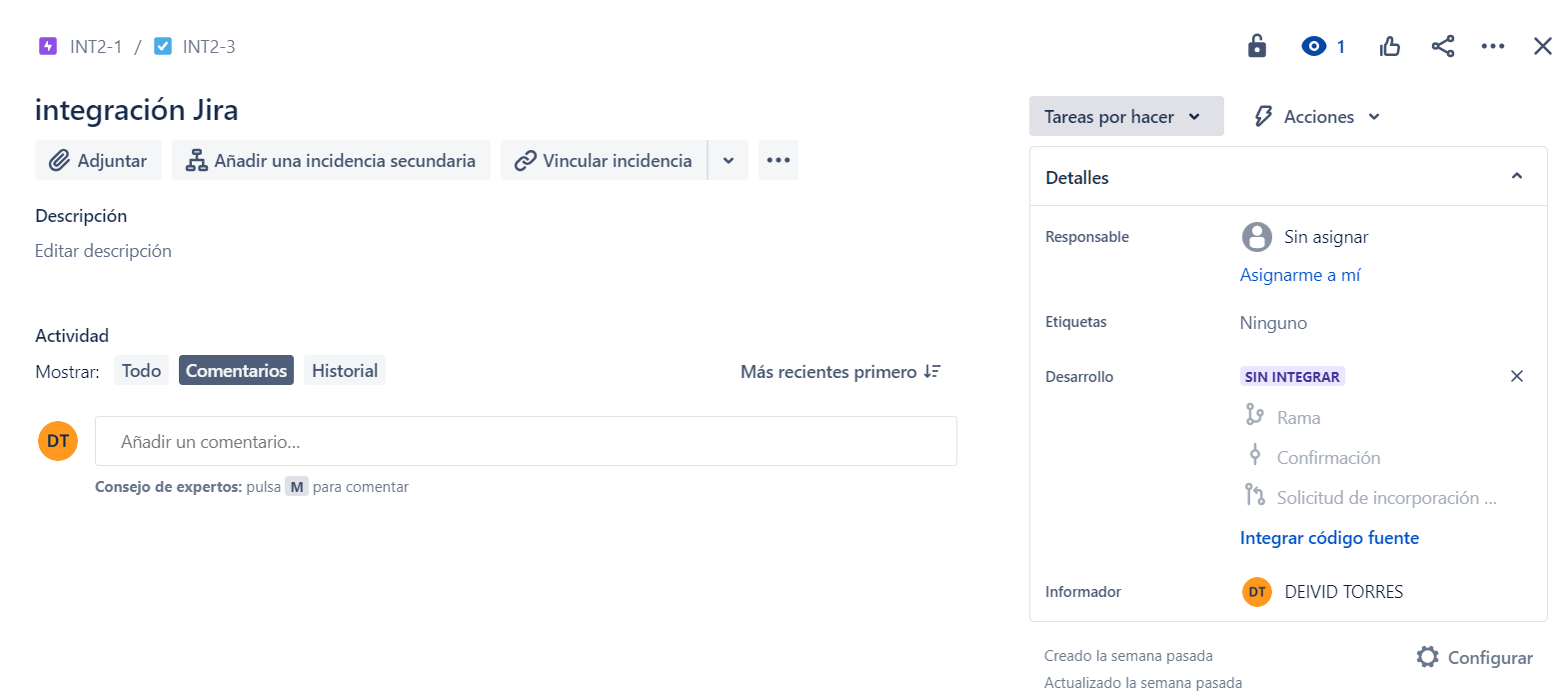Relationship between ASMS and Jira Cloud
To perform the integration, it is necessary to relate the fields of the Aranda ASMS ticket with the fields of the Jira Cloud issue through the “case” section of the configuration file.
JSON Structure
{
"case": [
{
"reference": "",
"definition": {
"subject": {
"type": "",
"key": ""
},
"description": {
"type": "",
"key": ""
},
"responsible": {
"type": "",
"key": "",
"searchBy": [ "Email" ],
"defaultValue": {
"id": 0,
"value": ""
}
},
"responsibleGroup": {
"key": "",
"type": "",
"defaultValue": {
"id": 0,
"value": ""
}
},
"client": {
"type": "",
"key": "",
"searchBy": [ "Email" ],
"defaultValue": {
"id": 0,
"value": ""
}
},
"company": {
"type": "",
"key": "",
"defaultValue": {
"id": 0,
"value": ""
}
},
"applicant": {
"type": "",
"key": "",
"searchBy": [ "Email" ],
"defaultValue": {
"id": 0,
"value": ""
}
},
"typeRegister": {
"type": "",
"key": "",
"defaultValue": {
"id": 0,
"value": ""
}
},
"ci": {
"type": "",
"key": "",
"defaultValue": {
"id": 0,
"value": ""
}
}
}
}
]
}
Properties :
| Properties | Description |
|---|---|
| Reference | Unique identifier to create a relationship between the concepts project > category, itemType, typeRegister, applicant, responsibleGroup, responsible, company, client see |
| Definition | Allows you to relate ASMS case fields to Issue fields in Jira Cloud |
Definition
To perform the integration it is necessary to relate the case fields in Aranda ASMS with the Jira Cloud Issue through the “definition” section of the configuration file, these properties in ASMS can be associated with fields of type list or string in Jira Cloud, excluding the subject and description property.
Properties:
| Properties | Description | |
|---|---|---|
| subject | Represents the field Subject of the case in Aranda and allows you to relate this field to an equivalent field of the Issue in Jira Cloud, it is recommended to use the Summary. | |
| Description | Represents the field Description of the case in Aranda and allows you to relate this field to an equivalent field of the Issue in Jira Cloud. | |
| typeRegister | Represents the field Record Type of the case in Aranda and allows you to relate this field to an equivalent field of the Issue in Jira Cloud. | Internal properties |
| responsibleGroup | Represents the field Responsible Group of the case in Aranda and allows you to relate this field to an equivalent field of the Issue in Jira Cloud. | Internal properties |
| responsible | Represents the field Responsible of the case in Aranda and allows you to relate this field to an equivalent field of the Issue in Jira Cloud. | Internal properties |
| applicant | Represents the field Applicant of the case in Aranda and allows you to relate this field to an equivalent field of the Issue in Jira Cloud. | Internal properties |
| Company | Represents the field Company of the case in Aranda, allows you to relate this field to another equivalent field of the Issue in Jira Cloud. | Internal properties |
| client | Represents the field Customer of the case in Aranda and allows you to relate this field to an equivalent field of the Issue in Jira Cloud. | Internal properties |
| Ci | Represents the field CI of the case in Aranda and allows you to relate this field to an equivalent field of the Issue in Jira Cloud. | Internal properties |
Caso en ASMS: Ilustración de referencia, información del cliente de los casos en la plataforma ASMS

Caso en ASMS parte 2: Ilustración de referencia, información básica de los casos en la plataforma ASMS

Issue Jira Cloud: Ilustración de referencia, información básica de los tickets en la plataforma Jira Cloud

Internal properties
{
"key": "",
"type": "",
"searchBy": [ "Email" ],
"defaultValue": {
"id": 0,
"value": ""
}
}
Where:
| Properties | Description | |
|---|---|---|
| type | Association type, the supported types are Value, Mapper, FieldValue. | FieldValue, Value, Mapper. |
| Key | Name or ID of the field in Jira Cloud where the information will be searched and updated. | Properties in Jira Cloud |
| searchBy | Field search property, only applies to fields of type “User” (responsible, applicant, client) | see |
| defaultValue | Allows you to add a default value. | see |
defaultValue property
- The property defaultValue allows you to add default values, if you add this property with the value of defaultValue.id for the case in Aranda or defaultValue.value for the Issue in Jira Cloud, the system adds the default value to the platform that set the value.
- For the “subject, description” fields, you can’t add a default value because they are user-written values and a value relationship isn’t supported.
- You can only add a default value if the mapping type is “Mapper” or “FieldValue”.
Example:
- Set the value “incident” to the Reference.
- In the definition of the case Take Responsible Property (responsible).
- “type”: Assign the association type as FieldValue.
- “key”: Assign the name of the property in Jira Cloud as assigned_to (Properties in Jira Cloud).
- “defaultValue”: Assign the defaultValue.
{
"case": [
{
"reference": "incident",
"definition": {
"responsible": {
"key": "assigned_to",
"type": "FieldValue",
"defaultValue": {
"id": 222,
"value": "id_usuario_jira_cloud"
}
}
}
}
]
}
Search Property
The searchBy property is OPTIONAL, is only valid for the type “FieldValue” and for the responsible, applicant, and client fields.
This tag allows you to define the property by which the user search will be performed on the ASMS and Jira Cloud platforms; the supported property is “Email” and by default it will search for the “name” property if the “searchBy” tag is not added.
Use Case
For proper use of the “Email” search property, users of the two platforms must have the same email per user. The following is an example of the applicant property with the option to search by “Email”.
{
"applicant": {
"type": "FieldValue",
"key": "Custom.applicant",
"searchBy": [ "Email" ]
}
}
Types of relationship or association of fields
The following association types determine how the values of the ticket properties will be obtained.
| Name | Description | Example |
|---|---|---|
| Value | Allows you to assign a value to the selected field through the configuration file. The value is required to be within the value ratio properties | See example |
| Mapper | Seeks to associate and/or relate the values of the Aranda case with the values of the Jira Cloud Issue field indicated in the key property in Jira Cloud, the value ratio is made 1 to 1, the assignment is not allowed to be repeated | See example |
| FieldValue | Property values are sent directly between platforms without any association/relationship | See example |
Type example Value
- Set the value “incident” to the Reference.
- In the definition of the case Take the property Applicant (applicant) and assign the association type as Value.
{
"case": [
{
"reference": "incident",
"definition": {
"applicant": {
"type": "Value"
}
}
}
]
}
- The relationship implies that a value must be assigned in a common way for all the Cases, this is accomplished by using the “applicant” property, as shown below:
{
"case": [
{
"reference": "incident",
"definition": {
"applicant": {
"type": "Value"
}
}
}
],
"applicant": [
{
"reference": "",
"id": 10
}
]
}
- Assign a value to the property “applicant.reference”:
{
"case": [
{
"reference": "incident",
"definition": {
"applicant": {
"type": "Value"
}
}
}
],
"applicant": [
{
"reference": "incident",
"id": 10
}
]
}
⚐ Note: The Cases associated with the “reference” “incident”, in ASMS they will be assigned the requester with ID 10.
Type example Mapper
- Set the value “incident” to the Reference.
- In the definition of the case Take the property Applicant (applicant).
- “type”: Assign the association type as Mapper.
- “key”: Assign the name of the property in Jira Cloud as applicant_id_jira_cloud (Properties in Jira Cloud).
{
"case": [
{
"reference": "incident",
"definition": {
"applicant": {
"type": "Mapper",
"key": "applicant_id_jira_cloud"
}
}
}
]
}
- The relationship implies that you must associate the Aranda Desk Requesters (ASMS) with the Jira Cloud Requesters, it is recommended to write the Id of the applicant to be related, as shown below:
{
"case": [
{
"reference": "incident",
"definition": {
"applicant": {
"type": "Mapper"
}
}
}
],
"applicant": [
{
"reference": "incident",
"mapping": [
{
"id": 5,
"value": "id_solicitante_jira"
}
]
}
]
}
⚐ Note: Requester with Aranda table ID “5” (ASMS) is related to requester “id_solicitante_jira” in Jira Cloud***
Type example FieldValue
- Set the value “incident” to the table.
- In the definition of the case Take the property Applicant (applicant).
- “type”: Assign the association type as FieldValue.
- “key”: Assign the name of the property in Jira Cloud as applicant_id_jira_cloud (Properties in Jira Cloud).
{
"case": [
{
"reference": "incident",
"definition": {
"applicant": {
"type": "FieldValue",
"key": "applicant_id_jira_cloud"
}
}
}
]
}


